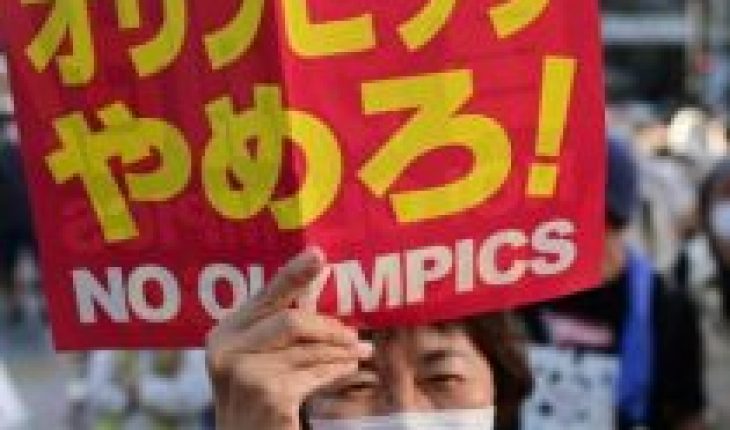
Empty stadiums, hotels and restaurants without foreign tourists and businesses with few customers.
The disappointment of those who had made large investments in anticipation of a commercial boom triggered by the Olympic Games has been brutal.
It is that the event in Tokyo, which was postponed last year due to the covid-19 pandemic, is taking place without an audience and in a city in state of emergency because of the health crisis.
Despite persistent protests against the holding of the Games and two-thirds of the Japanese population opposing them for fear that they would become a “super-spreading” event of the pandemic, the competitions are moving forward.
Not without controversy. One of the great sponsors of the event, the automotive Toyota, announced a few days ago that it will not use commercial notices connected to the Tokyo Olympics because of concerns in the country about the pandemic.
And some business leaders in Japan such as Takeshi Niinami, ceo of the company Suntory, stated that the Olympics are losing their commercial value and that his firm decided not to be part of the sponsors because it considered them “too expensive”.
Something that had already been warned by experts in the financial world such as Takahide Kiuchi, an economist at the Nomura Research Institute, who wrote in a report that “much of the expected economic benefit of the Tokyo Games disappeared in March, when it was decided to ban foreign spectators from traveling to Japan.”
“It would have been better not to have them”, said Suehiro Toru of investment bank Daiwa Securities, despite the costs of suspending them.
The business outlook is bleak, but not just because of the havoc the pandemic has wrought.
A “bad deal”
For years, several economists have published research to show that the Olympics are a “bad deal” for the city – and the country – that hosts them.
The arguments that are most repeated are that, instead of consumption, tourism and prestige, the event leaves a millionaire debt and infrastructure works that end up becoming “white elephants” completely useless.
From small businesses to large hotel chains have suffered the impact of games without an audience. Credit: Getty Images.
“The losses will be enormous”, Robert Baade, professor of Economics at Lake Forest University in the United States and former president of the International Association of Sports Economists, tells BBC Mundo.
Although it is difficult to put into figures the true magnitude of the economic losses for Japan, because the calculations operate on the basis of estimated values in relation to what would have been the “gains” generated by the event in other circumstances, the economist says that, anyway, it is possible to make a projection.
From their perspective, the losses may be some US$15,000 million.
What is known for sure is that some $800 million has vanished from ticket sales. But the issue becomes more complex when you have to estimate how much the tourism sector and all the businesses associated with it have lost, as well as other sectors that hoped for an economic revival thanks to the Games.
What the government says
The event has become a challenge for the nation of the rising sun, which “when it won this opportunity hoped it would serve to demonstrate its rebirth after the triple crisis of 2011 and its return to the world’s front line, with an eye on Beijing, which will host the next, the winter ones in 2022” , explains Tamara Gil, BBC World’s special envoy to Tokyo.
In the midst of the maelstrom, Japan’s government has come out to try to calm the waters.
Japan’s Prime Minister Yoshihide Suga declared a state of emergency due to the covid-19 pandemic. Credit: Getty Images.
Prime Minister Yoshihide Suga has said he is confident that measures to keep the public away from the event will prevent an escalation of the pandemic and that the country will still benefit from a huge global television audience.
“I decided that the Olympics can go ahead without compromising the safety of the Japanese people,” Suga said in an interview.
“The simplest and easiest thing to do is to stop them,” he added. but “the government’s job is to address the challenges”.
Suga is not in a comfortable position, considering his approval rating has dropped and he will face elections by the end of this year.
On the other hand, the commitment to become the host country of the event was made almost a decade ago by his predecessor, Shinzo Abe, a political ally of Suga, who inherited this great challenge.
The problem is that there is less and less interest on the part of governments to host the event, precisely because the benefits it generates have been questioned.
The only ones interested in responding to the last call to host the post-Tokyo Games were Beijing and Almaty (Kazakhstan). The bet was won by China.
How costly have these Olympics been?
As is often the case with the Olympics, the planned budget for the event ended up climbing beyond the initial forecasts.
In 2013, the cost of the event was officially estimated at US$7,300 million. At the end of 2019 it rose to US$12,600 million and later to US$15,400 million.
Subsequently, japan’s National Audit Board reported that the final cost is approaching the US$22,000 million.
And then the local media Nikkei and Asahai they did their own research placing the figure at US$28,000 million.
Credit: Getty Images.
At the end of the day, whichever calculation is considered more accurate, there is no doubt that the initial projections were largely exceeded, something that has been a constant over the last few years.
“History shows that the Olympics end up generating losses for the host countries,” baade explains. “What’s happening in Japan has been going on since long before the pandemic.”
Japanese sponsoring firms that contributed some $3,300 million are concerned about how this saga has evolved.
And the losses, experts say, could increase if the Games eventually end up being the “super-propagatory event” some fear.
“That would be a disaster that would add to the current losses,” Baade says. “Let’s cross our fingers that that doesn’t happen.”
Who loses the most?
According to Victor Matheson, professor of Economics at the University of the Holy Cross in Massachusetts, United States, the unofficial cost of the Olympic Games could have reached US$25 billion, even before the additional expenses caused by the containment of the pandemic.
On the other hand, the millionaire revenue from tickets, sponsors or tourism for Japan, have fallen dramatically, Matheson tells BBC Mundo.
But the ones who haven’t suffered a big financial impact, he argues, are the organizers of the International Olympic Committee (IOC).
“The IOC’s revenue remain intact as long as the games continue to be televised,” he says.
“There’s still a big opportunity”
Several of the more than 60 companies that invested in the event have expressed concern about the profitability of their funds.
“This is not an ideal situation,” Michael Payne, former head of marketing for the International Olympic Committee, acknowledged in an interview.
The Yokohama International Stadium will host the olympic football final. Credit: Getty Images.
However, his prognosis still maintains a certain level of hope.
Companies could still be “pleasantly surprised by the potential benefit it will leave the legacy of these games so hard.”
“There is still an important opportunity,” he added.
A radical solution
Andrew Zimbalist, who has published three books on the economics of the Olympics, has criticized the benefits that the event leaves in the cities that host it.
And in the case of Tokyo, he argues that the government has spent some US$35,000 million, the highest figure ever put on the table.
Andrew Zimbalist proposes that the same city host the Games every two years. Credit: Getty Images.
His position is that the gigantic investments in infrastructure that are made to host the event – such as the construction of stadiums, Olympic villages or renovation of existing facilities – often end up benefiting construction companies, rather than the local economy.
In an interview with the newspaper The New York Times, Zimbalist proposed that if we lived in a rational world, “we would have the same host city of the Games every two years.” There is no reason to rebuild works every four years, he said. “It doesn’t make sense for cities.”
“When the modern Olympics were created in 1896, we had no international telecommunications or international travel on airplanes. So, in order for the world to participate and enjoy the Olympics, it had to move. We don’t have to do that anymore,” the researcher proposed.
A proposal that so far does not seem to have gained followers, at least in the public debate, but that after the Tokyo Games and with the effects that the covid-19 pandemic has had on the world, perhaps it could begin to be debated.





